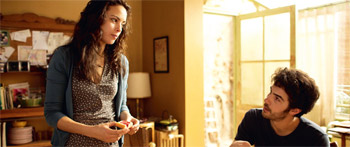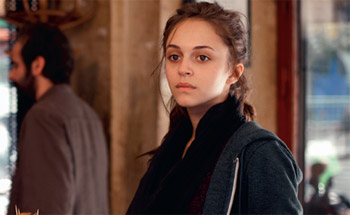Mahmoud Kalari The Past Interview

Mahmoud Kalari The Past Interview
Cast: Bérénice Bejo, Tahar Rahim, Ali Mosaffa, Pauline Burlet, Elyes Aguis, Jeanne Jestin, Sabrina Ouazani, Babak Karimi, Valeria Cavalli
Director: Asghar Farhadi
Genre: Drama, Mystery
Rated: PG
Running Time: 130 minutes
Synopsis: Following a four year separation, Ahmad returns to Paris from Tehran, upon his French wife Marie's request, in order to finalise their divorce procedure. During his brief stay, Ahmad discovers the conflicting nature of Marie's relationship with her daughter Lucie. Ahmad's efforts to improve this relationship soon unveil a secret from their past.
The Past
Release Date: February 6th, 2014
Interview with Mahmoud Kalari
Question: As a cinematographer, what is special about working with Asghar Farhadi?
Mahmoud Kalari: Working with Asghar Farhadi is always a thrill because there are many unknown factors. It's a very spontaneous method of filming with a lot of last minute decisions, which are by nature hard to predict. I find that to be really exciting. Difficult, but exciting. Asghar Farhadi has one very distinct characteristic: I think he doesn't know how to make a bad film. I believe there is an important reason for that. He immerses himself in the project and lets emotion drive his decision-making. For people who are unfamiliar with his process, it can be difficult, that's for certain. But if you accept it, you find yourself constantly discovering, moving from one surprise to another.
Question: How did you define with Asghar Farhadi what the look of this film would be?
Mahmoud Kalari: In A Seperation, the camera was entirely handheld except for three still shots. But you should be aware that Mr Farhadi is capable of going back on a large part of what you had previously defined at the last minute. He does it every time. You may have discussed the style and the visual nature of the film, but you always have to be ready for him to change his mind. He does the same thing with the actors. In the last take, he may say to them to forget all of the direction and to play the part in an entirely different way. He does this often. In the beginning, this film was also meant to be all shot with a handheld camera. But very quickly, by the end of the second day, the decision was made to do still shots. The story itself and the structure of the narrative persuaded to change our method and find a new form which we then adopted.
 Question: How does Asghar Farhadi behave on set?
Question: How does Asghar Farhadi behave on set?
Mahmoud Kalari: He rejects everything that seems artificial or conventional to him, in terms of composition, lighting, acting, everything... you can hear him saying to the actors, "Now you are acting", "That was too cinematic". He does the same thing when setting up the shot. He'd say : "It's overly composed", "the frame looks too neat", "the lighting is too perfect", "It's too beautiful, I don't want that!" Asghar Farhadi considers that a shot is just right, according to his ideas, specifically when it doesn't respect the established norms. It's sometimes difficult for his collaborators to understand this and to trust him. I believe that the more important thing for him is coherence between the global conception and, at the same time, the conception of each sequence. There are certain chapters in the story that he wanted to be static, immobile, even heavy. For others, he wanted lots of movement. Certain sequences are composed of very short shots, like the last two chapters we filmed. And there are also long shots mixed in. This can disturb the homogeneity of the global structure of the film. But I have to say that he's a master who has the artistry to control everything while assuring that the coherence and the continuity of the film remain in place.
Question: In A Seperation, the characters are fleeing from one another, in The Past, they are often filmed together...
The Past
Release Date: February 6th, 2014
MORE
- Mission: Impossible Fallout
- Glenn Close The Wife
- Allison Chhorn Stanley's Mouth Interview
- Benicio Del Toro Sicario: Day of the Soldado
- Dame Judi Dench Tea With The Dames
- Sandra Bullock Ocean's 8
- Chris Pratt Jurassic World: Fallen Kingdom
- Claudia Sangiorgi Dalimore and Michelle Grace...
- Rachel McAdams Disobedience Interview
- Sebastián Lelio and Alessandro Nivola...
- Perri Cummings Trench Interview



